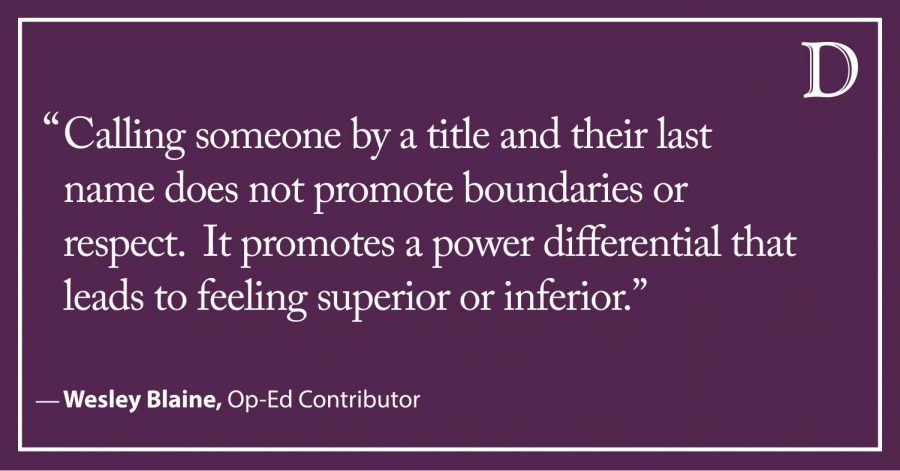Blaine: Why Northwestern students should address their professors with first names
May 18, 2020
My 5-year-old son’s teacher insists that the children in her classroom call her Rebecca. My wife’s OB-GYN, who delivered our son, asks that my wife and I call her Abby.
Disney requires its employees to call each other by their first names, as do UPS, Xerox, General Electric, and Mars Inc. who even states in its recruiting brochure that “everyone in the company is on a first name basis.”
One study found that a first-name policy can boost morale, commitment and communication. In fact, when superiors and subordinates are on a first name basis, there are “consistently positive effects relative to outcomes such as worker satisfaction.”
The study defined worker satisfaction as “improved morale and commitment, better communication patterns, (and) organizational citizenship behaviors.” Researchers in this study concluded that “common sense suggests that reciprocal first-naming is conducive to status leveling, thus representing a positive convention.”
If some of the top-performing companies in America have their employees use first names to boost morale, commitment and communication, then why do some NU professors insist on being addressed by their last name and educational degree?
My wonderful academic advisor told me that it maintains boundaries. And while I respect her opinion, her reason does not hold up to scrutiny.
I can maintain boundaries and be respectful when I address someone by their first name. I can also violate boundaries and be disrespectful by calling someone by their last name and educational title. It’s all in how I address someone. The key is my nonverbal body language and tone.
My sister, who holds a doctorate degree and is a biomedical professor at the University of Georgia, said students should address their professors by their educational degree and last name to “differentiate our levels.”
I love and respect my sister immensely. But I disagree with her on this point.
Students already know that their professors have higher status and should be treated with respect. Most give this respect, willingly, the way an employee respects their boss. And students that don’t respect their teachers won’t start doing so because there is a “doctor” before their teacher’s last name.
Another argument is that a professor has worked hard to get their doctoral degree, and has earned the right to be addressed with the title “doctor.” But doctoral programs come in a variety of difficulties. Some are challenging. Others seem to practically hand out degrees. A national accrediting organization does not exist for Doctors of Philosophy the way it does for medical doctors.
Besides, if we insist on addressing people based on their education, then why aren’t people with a Master’s degree called master? Because this is utterly ridiculous. The word “master” has ugly connotations to the U.S.’s horrid history of slavery, too.
If there is any doubt in your mind about why we must tear down the walls that titles create, I would like to show you what can happen when people are obliged to be deferential towards their superiors.
Malcolm Gladwell wrote about this in his book “Outliers” when he examined why Korean Air had the highest number of plane crashes in the late ’90s.
When a Korean Air plane was having mechanical trouble, Gladwell said the co-pilot deferred to the pilot because of the hierarchical aspects of Korean culture. That meant that a co-pilot did not speak up and tell the pilot that something may be wrong with the plane because they felt inferior to the pilot. The result was that Korean Air had more deadly plane crashes.
Calling someone by a title and their last name does not promote boundaries or respect. It promotes a power differential that leads to feeling superior or inferior. It tells one person that they are below someone else because they have less education.
It also prevents human beings from connecting. And the one place where human connection is essential is the classroom.
Teachers wield immense influence over a student. They have the ability to change a student’s life. And they must wield this power with care and responsibility so that students feel as though they are valued human beings. This may be why Rebecca, my 5-year-old son’s teacher, insists that her students call her by her first name.
“I’d prefer them to see me as a guide to help them move forward in all areas of their growth and development — as well as keeping them safe all the time,” Rebecca told me in an email. “I’m positioned next to them as a life-long learner, someone who can teach them many things, but I’m not the holder of ‘all knowledge.’”
Rebecca has an excellent point. I wish more professors would implement it.
Wesley Blaine is a graduate student in Northwestern’s counseling program. He can be contacted at [email protected]. If you would like to respond publicly to this column, send a Letter to the Editor to [email protected]. The views expressed in this piece do not necessarily reflect the views of all staff members of The Daily Northwestern.


